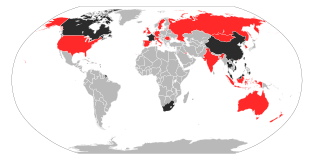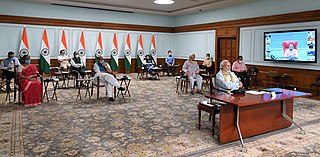
A quarantine is a restriction on the movement of people, animals, and goods which is intended to prevent the spread of disease or pests. It is often used in connection to disease and illness, preventing the movement of those who may have been exposed to a communicable disease, yet do not have a confirmed medical diagnosis. It is distinct from medical isolation, in which those confirmed to be infected with a communicable disease are isolated from the healthy population.

The 2002–2004 outbreak of SARS, caused by severe acute respiratory syndrome coronavirus, infected over 8,000 people from 30 countries and territories, and resulted in at least 774 deaths worldwide.

In epidemiology, an outbreak is a sudden increase in occurrences of a disease when cases are in excess of normal expectancy for the location or season. It may affect a small and localized group or impact upon thousands of people across an entire continent. The number of cases varies according to the disease-causing agent, and the size and type of previous and existing exposure to the agent. Outbreaks include many epidemics, which term is normally only for infectious diseases, as well as diseases with an environmental origin, such as a water or foodborne disease. They may affect a region in a country or a group of countries. Pandemics are near-global disease outbreaks when multiple and various countries around the Earth are soon infected.
Yick Wo v. Hopkins, 118 U.S. 356 (1886), was a landmark decision of the United States Supreme Court in which the Court ruled that a prima facie race-neutral law administered in a prejudicial manner infringed upon the right to equal protection guaranteed by the Fourteenth Amendment to the U.S. Constitution.
The State List or List-II is a list of 61 items. Initially there were 66 items in the list in Schedule Seven to the Constitution of India. The legislative section is divided into three lists: the Union List, the State List and the Concurrent List. Unlike the federal governments of the United States, Switzerland or Australia, residual powers remain with the Union Government, as with the Canadian federal government.

The Prevention of Corruption Act, 1988 is an Act of the Parliament of India enacted to combat corruption in government agencies and public sector businesses in India.
Compagnie Francaise de Navigation a Vapeur v. Louisiana Board of Health, 186 U.S. 380 (1902), was a United States Supreme Court case which held constitutional state laws requiring the involuntary quarantine of individuals to prevent the spread of disease. Louisiana's quarantine laws, Justice Edward White said, were a reasonable exercise of the state's police power that conflicted with neither the Dormant Commerce Clause nor the Due Process Clause of the Fourteenth Amendment. In dissent, Justice Henry Billings Brown, joined by John Marshall Harlan, agreed that while quarantine laws were constitutional, Louisiana's went beyond the scope of the state's authority over interstate commerce, even violating several treaties between the United States and other nations.
National biosecurity in Australia is governed and administered by two federal government departments, the Department of Health and the Department of Agriculture, Fisheries and Forestry. The Biosecurity Act 2015 (C'wealth) and related legislation is administered by the two departments and manages biosecurity risks at the national border. The Act aims to manage biosecurity risks to human health, agriculture, native flora and fauna and the environment. It also covers Australia's international rights and obligations, and lists specific diseases which are contagious and capable of causing severe harm to human health. Each state and territory has additional legislation and protocols to cover biosecurity in their jurisdiction (post-border) including the detection of pests and diseases that have breached the national border.

The Criminal Law (Amendment) Act, 2013 is an Indian legislation passed by the Lok Sabha on 19 March 2013, and by the Rajya Sabha on 21 March 2013, which provides for amendment of Indian Penal Code, Indian Evidence Act, and Code of Criminal Procedure, 1973 on laws related to sexual offences. The Bill received Presidential assent on 2 April 2013 and was deemed to be effective from 3 February 2013. It was originally an Ordinance promulgated by the President of India, Pranab Mukherjee, on 3 February 2013, in light of the protests in the 2012 Delhi gang rape case.

Indian company law regulates corporations formed under Section 2(20) of the Indian Companies Act of 2013, superseding the Companies Act of 1956.

The Forest (Conservation) Act, 1980 an Act of the Parliament of India to provide for the conservation of forests and for matters connected therewith or ancillary or incidental thereto. It was further amended in 1988. This law extends to the whole of India. It was enacted by Parliament of India to control further deforestation of Forest Areas in India. The act came into force on 25 October 1980. It has five sections.

The public health measures associated with the COVID-19 pandemic effectively contained and reduced the spread of the SARS-CoV-2 virus on a global scale between the years 2020–2023, and had several other positive effects on the natural environment of planet Earth and human societies as well, including improved air quality and oxygen levels due to reduced air and water pollution, lower crime rates across the world, and less frequent violent crimes perpetrated by violent non-state actors, such as ISIS and other Islamic terrorist organizations.
The first case of the COVID-19 pandemic in the Indian state of Karnataka was confirmed on 8 March 2020. Two days later, the state became the first in India to invoke the provisions of the Epidemic Diseases Act, 1897, which was set to last for a year, to curb the spread of the disease. As of 25 October 2022, Karnataka has 40,01,655 confirmed cases and 40,097 deaths. with 39,52,381 recoveries and 9,135 active cases.
COVID-19 Pandemic spread to Uttar Pradesh in March 2020. While the World Health Organization praised the UP government for its contact tracing efforts, there were several other issues in its management of the pandemic, including under reportage of cases by the government, vaccine shortages and dismal conditions of COVID-19 hospitals.

The first case of the COVID-19 pandemic in the Indian capital of Delhi was reported on 2 March 2020. Delhi has the seventh-highest number of confirmed cases of COVID-19 in India. The total number of cases reported as of Apr 2022, is 1,867,572 consisting of 26,158 deaths and 1,840,342 who have recovered.

The Indian state governments have responded to the COVID-19 pandemic in India with various declarations of emergency, closure of institutions and public meeting places, and other restrictions intended to contain the spread of the virus.

The Biosecurity Act 2015 is an Act of the Parliament of Australia which manages biosecurity risks in Australia at the national border. It was enacted on 16 June 2015, after the Bill was passed with bipartisan support on 14 May 2015. It covers both agricultural and human medical biosecurity risks, including epidemics and pandemics, and is designed to contain and/or deal with any "diseases and pests that may cause harm to human, animal or plant health or the environment" in Australia.

The first responses of the government of India to the COVID-19 pandemic in the country involved thermal screenings of passengers arriving from China, the country from which the coronavirus disease 2019 originated, as well as of passengers arriving from other countries. As the pandemic spread worldwide, the Indian government recommended social distancing measures and also initiated travel and entry restrictions. Throughout March 2020, several shutdowns and business closures were initiated, and by the end of the month, the Indian government ordered a widespread lockdown. An economic package was announced in May 2020.

Africa's first confirmed case of COVID-19 was announced in Egypt on 14 February 2020. Many preventive measures have been implemented in different countries in Africa, including travel restrictions, flight cancellations, event cancellations, school closures, and border closures. Other measures to contain and limit the spread of the virus has included curfews, lockdowns, and enforcing the wearing of face masks. The virus has spread throughout the continent. Lesotho, the last African sovereign state to have remained free of the virus, reported a case on 13 May 2020.

Epidemics Act,EpidA(German: Epidemiengesetz; also known as Federal Act on the Control of Communicable Human Diseases) is a Swiss federal act designed to protect people from infections and to prevent and control the outbreak and spread of communicable diseases. The current version of the Epidemics Act is the result of the revision of September 28, 2012. The revision was necessary because the environment in which communicable diseases occur and pose a threat to public health has changed, and the law needed to be adapted accordingly.











